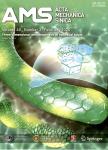Loading direction-dependent shear behavior at different temperatures of single-layer chiral graphene sheets
Loading direction-dependent shear behavior at different temperatures of single-layer chiral graphene sheets作者机构:Jiangsu Key Laboratory of Advanced Food Manufacturing Equipment and Technology Jiangnan University
出 版 物:《Acta Mechanica Sinica》 (力学学报(英文版))
年 卷 期:2018年第34卷第3期
页 面:542-548页
核心收录:
学科分类:081704[工学-应用化学] 07[理学] 08[工学] 0817[工学-化学工程与技术] 0703[理学-化学] 070301[理学-无机化学]
基 金:support from the National Natural Science Foundation of China (Grant 11572140) the Fundamental Research Funds for the Central Universities (Grants JUSRP11529, JUSRP115A10, JG2015059) the research and practice project of teaching reform of graduate education in Jiangsu (Grant JGLX16_048) the Undergraduate Innovation Training Program of Jiangnan University of China (Grant 2015151Y) the Undergraduate Innovation and Entrepreneurship Training Program of China (Grant 201610295057) the Research Fund of State Key Laboratory of Mechanics and Control of Mechanical Structures (NUAA) (Grant MCMS-0416G01) the "Project of Jiangsu provincial Six Talent Peaks" in Jiangsu Province "Thousand Youth Talents Plan"
主 题:Chiral grapheme Shear behavior Buckling strain Wrinkles
摘 要:The loading direction-dependent shear behavior of single-layer chiral graphene sheets at different temperatures is studied by molecular dynamics (MD) simulations. Our results show that the shear properties (such as shear stress-strain curves, buckling strains, and failure strains) of chiral graphene sheets strongly depend on the loading direction due to the structural asymmetry. The maximum values of both the critical buckling shear strain and the failure strain under positive shear deformation can be around 1.4 times higher than those under negative shear deformation. For a given chiral graphene sheet, both its failure strain and failure stress decrease with increasing temperature. In particular, the amplitude to wavelength ratio of wrinkles for different chiral graphene sheets under shear deformation using present MD simulations agrees well with that from the existing theory. These findings provide physical insights into the origins of the loading direction-dependent shear behavior of chiral graphene sheets and their potential applications in nanodevices.



